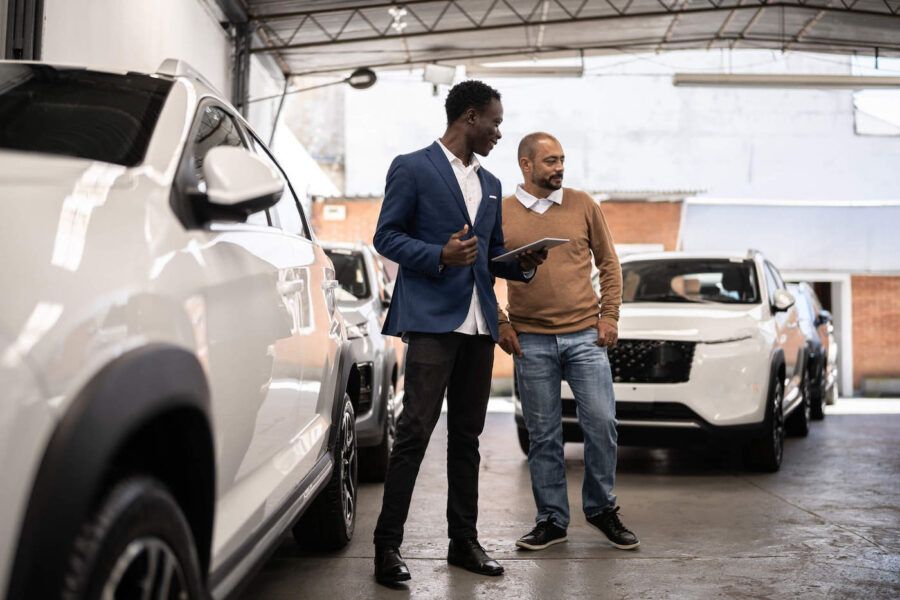In this article:
Traditionally, the end of the year can be a good time to find a deal on a new or used car, and you can still save some money with time and effort. However, car buyers may not get the same savings in 2022 that they usually see due to a few factors impacting car prices and monthly payments.
If you're in the market for a new car, here's what you need to know about year-end opportunities.
Why You Might Not Get the Best Deal This Year
The end of 2022 can still be a good time to find a deal, but compared to past years, the savings may not be as impressive for a few reasons:
- Low inventory of new cars: New-car inventory is at its highest level since June 2021, according to data from Cox Automotive. But the 1.32 million available new vehicles in September 2022 were still well below the 3.45 million that were available in September 2019. Lower inventory and strong demand will continue to keep average prices high.
- High prices: The Cox Automotive report notes that the average price for a new car dropped in September 2022 (down from August 2022) to $46,294, but in September 2019, that average was $37,110. So, even if you get a deal, it'll still likely be more than what you would've paid before the pandemic began. Additionally, used-car prices spiked over the past couple of years due to the shortage of new vehicles, and while those prices are also coming down, they remain higher than pre-pandemic levels.
- Rising interest rates: As the Federal Reserve continues to hike its federal funds rate to combat inflation, auto loan rates have followed suit. In the third quarter of 2022, the average interest rate for a new car hit 5.7%, jumping from 4.3% during the same period last year, according to research firm Edmunds. Additionally, the average rate on a used car increased from 7.4% last year to 9% this year.
How to Get the Best Deal on a Car at the End of 2022
Of course, it's still possible to save money based on current pricing, but it will take some work to accomplish your goal. Here are some tips to help.
Consider Used Instead of New
While used car prices remain high, they're still cheaper than brand-new cars. Additionally, you'll likely have an easier time finding the model you want.
Aggressively Track Prices
Look up prices for the model you want across several dealerships in your area, and consider comparing those prices to similar models to ensure you're getting the best value.
If you find the same model with similar mileage and condition at multiple dealerships, you may be able to use the differences in prices to negotiate a better offer with one of them. You can even take that offer to the other dealership to further maximize your savings.
Secure Financing First
Regardless of the price of the vehicle, you may be able to get more favorable financing terms if you get approved for an auto loan before you step foot in the dealership. Take your time to shop around and compare multiple lenders to ensure that you get the best offer.
Then, you can take your approval to the dealer. Some lenders may even deposit the money into your account before you go to the dealership so you can effectively be a cash buyer, which can give you an advantage in the negotiation process.
Shore Up Your Credit
While you can't control the fact that interest rates are going up, you can still make sure you qualify for the best rates available by improving your credit. Check your credit score and review your credit report to gauge your overall credit health and focus on areas you can address.
Potential ways to improve credit fast can include paying down credit card balances, disputing inaccurate credit report information, becoming an authorized user on a loved one's credit card account and getting credit for eligible rent, utility and streaming payments with Experian Boost®ø.
Other Good Times to Buy a Car
The end of the year isn't the only good time to get a deal on a car. If you have some flexibility with your timeline, here are some alternatives:
- Holidays: Dealerships often run special promotions around holidays, such as Presidents Day, Memorial Day, the Fourth of July, Labor Day, Black Friday and New Year's Day.
- End of the month or quarter: Salespeople typically have monthly and quarterly quotas, making them more willing to meet you halfway in negotiations.
- Mondays: Car buyers typically shop on the weekend, leaving dealers with more time and availability to answer questions and negotiate on Mondays.
- End of the model year: If next year's model is expected to be introduced soon, dealers will have an incentive to clear lot space for the latest year. The latest models are typically introduced during the fall season, but it can happen anytime, so stay up to date with the manufacturer if you have a specific model in mind.
- Certain months: Certain months have historically been better for car buyers than others. For example, some dealers start rolling out Memorial Day sales early to kickstart the summer buying season, and October through December remain good times due to the change in model year and year-end holiday sales.
The Best Time to Buy a Car Is Before You Need It
While it may be tempting to wait until you find just the right deal, waiting too long to buy a car could limit your flexibility and force you into a poor offer.
If you don't necessarily need a new car, you'll have plenty of time to research deals and pricing and negotiate with dealers. However, if your current vehicle is on its last legs or you don't have a car right now, you might need to speed up the process a bit and take what you can get.

